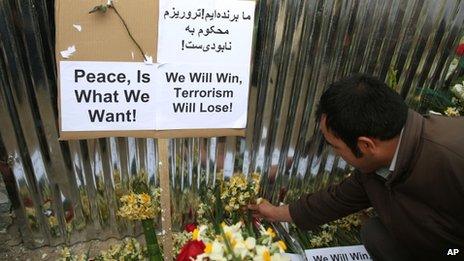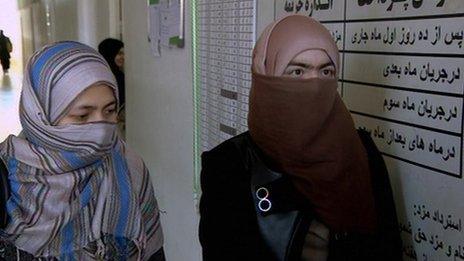Will the Taliban take over in Afghanistan?
- Published
BBC's John Simpson: "Whenever the outside world has ignored Afghanistan, disaster has invariably followed"
Later this year, the last remaining British and American troops will pull out of Afghanistan. Will the Afghans be able to cope or will the Taliban take over? For The Editors, a programme which sets out to ask challenging questions, I decided to find out.
From the end of this year Afghanistan will be on its own. No matter how bad things get, no American or British government will come back to help.
So once the Afghan national forces are left largely to their own devices, will they be able to cope with the challenge? Or will the Taliban win the war, and control Afghanistan as they did from 1996 to 2001?
Most experts think the chances of an outright Taliban victory are slight.
Nowadays the Afghan army and police are an impressive body of men (and to a relatively small extent, of women), who have been thoroughly trained and show a real pride in themselves.
Their equipment is first class and their commanders are selected on the basis of ability.
They are as different from the feeble, unwilling Afghan soldiers and policemen I used to report on 20 years ago as it is possible to imagine.
The Taliban found it relatively easy to beat the mujahideen government and they managed to convince sizeable numbers of uncommitted warlords they were going to win, and won them over to their side.
Today Afghanistan is a different country: there is much more money around, and it seems altogether more advanced.
Corruption is everywhere, especially in government, but no-one who remembers the disastrous years of Taliban rule, when corruption reached new heights, is likely to believe the Taliban will be any better.
Danger of whistling
You only have to be in your 20s to remember what life under the Taliban was like.
If you whistled a tune, or allowed your shalwar kameez to ride up above your ankle, or flew a kite, or played chess, or owned a picture of any living creature, you could be arrested, beaten, or even executed.
The Taliban raided houses, confiscating television sets and video-tapes, and hung them from the lamp-posts as a warning.
It was the most extreme society I have ever seen, anywhere in the world. Iran at its revolutionary height seemed liberal by comparison.
Before they captured Kabul, no one gave the Taliban a serious chance of winning.
The first time I realised they might win was in the early months of 1996, when I was in Kandahar and watched their leader, Mullah Omar, lift the Prophet's cloak out of a container where it had been kept for more than 1,000 years, and hold it up to show to the huge, adoring crowd.
This time, the Taliban do not show the same kind of intensity.
But they are better organised than they used to be, and they are battle-hardened from fighting the British and Americans. Both armies have real respect for their fighting qualities.

Earlier this month, 14 people were killed in a suicide bombing at a Kabul restaurant
I interviewed their spokesman, Zabiullah Mujahed, over the phone while I was in Afghanistan this time. It was the first full interview he had done for well over a year.
The Americans maintain that Mujahed is not one person, but several; but the man I spoke to remembered that I had interviewed him four years ago, and that an American aircraft had flown over him menacingly while our interview was going on.
Mujahed defended the record of the Taliban when they were in power.
"If you speak to the ordinary people of Afghanistan, if you ask the real representatives of the Afghan people, especially those who are in the villages and remote areas, they will tell you that in Afghanistan there was a sound Islamic emirate government. This system contains guidance for individuals and for society collectively, and it brought positive development," he told me.
Civil war?
Might there, I asked, be all-out civil war when the British and Americans leave?
"It is not the responsibility of the West to bring peace to Afghanistan and to be concerned about us. They should withdraw their forces from Afghanistan because their presence is the cause of catastrophe... They should put an end to their aggression, and after that the Afghans themselves will know what to do," he replied.
And what would that be?
It seems to me that if the new president, who will be voted in at the elections in April, is skilful, then he may be able to do a deal with at least some parts of the Taliban.
Those who reject it will continue fighting, but there will be fewer of them.

These women may be devout Muslims but they do not want the Taliban back in power
As part of the price for the deal, the new president will have to introduce more Islamic practices.
But whether the West likes it or not, the Taliban represent an important element in the make-up of Afghanistan.
If there is to be any kind of peace, it will be impossible to exclude them altogether.
As the withdrawal of British, American and other forces from Afghanistan draws closer, the Taliban and their allies are raising the number of their attacks.
Their aim is clearly to give the impression that they have driven the foreign troops out.
Watch The Editors on BBC One at 23:20 GMT on Monday 27 January (except in Wales and Northern Ireland) or catch it later on iPlayer.